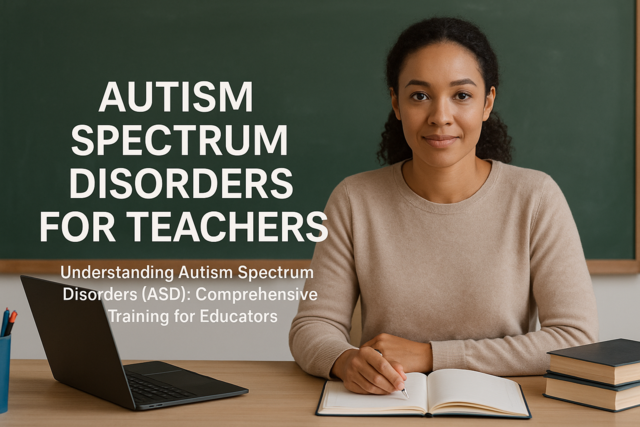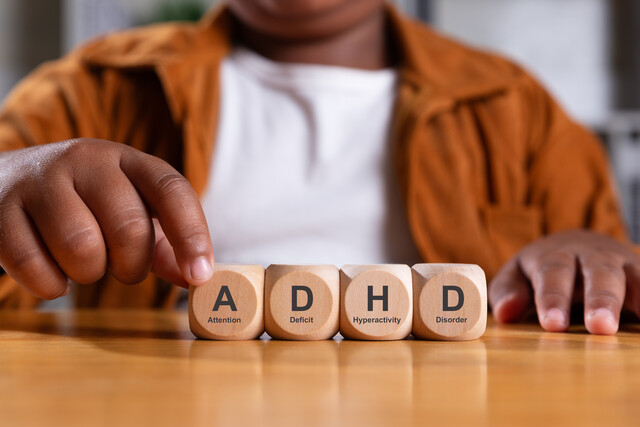Online Class: Emotional and Behavioral Disorders

no certificate
with CEU Certificate*
-
10Lessons
-
20Exams &
Assignments -
1,075Students
have taken this course -
9Hours
average time -
0.9CEUs
Course Description
Understanding Emotional and Behavioral Disorders: A Comprehensive Guide
Delve deep into the world of Emotional and Behavioral Disorders (EBD) with this meticulously curated, research-driven course. Designed to unravel the complexities surrounding these disorders, this program is anchored in contemporary research and best practices in the field. If you are an educator, teacher, counselor, parent, or an individual with a keen interest in understanding EBD, this course will serve as an invaluable resource.
Course Overview: Spanning ten comprehensive lessons, the course delves into the multifaceted nature of EBD. From foundational definitions to intricate diagnostic methods and strategies for advocacy, each module is structured to impart knowledge that is both profound and applicable.
Detailed Course Structure:
-
Lesson 1: Introduction to EBD - Understand the nuances of Emotional Disturbance and Behavioral Disorders. Discover the distinctions and overlaps that define these conditions.
-
Lesson 2: Characteristics Deep Dive - Explore the distinctive traits of individuals with EBD, emphasizing how they manifest in varied settings and stages of life.
-
Lesson 3: Examining Prevalence - Delve into the current statistics surrounding EBD. Gain insights into global and regional prevalence rates, trends over time, and demographic variations.
-
Lesson 4: Causes and Etiology - Understand the myriad causes of EBD, from genetic factors to environmental triggers and their interplay. Explore case studies that highlight the complexities of causation.
-
Lesson 5: Assessment And Diagnosis - Master the methods and tools used to diagnose EBD. Learn about standardized tests, observational techniques, and interdisciplinary assessments, and the pivotal role they play in crafting interventions.
-
Lesson 6: Navigating Educational Placements and Services - Gain insights into the most effective educational placements and services for individuals with EBD. Understand the principles that guide these decisions and the importance of individualized educational plans.
-
Lesson 7: Functional Behavioral Assessment (FBA) - Learn the intricacies of FBA, a process that identifies specific problematic behaviors, their triggers, and their consequences. Through real-world examples, understand its importance in developing effective interventions.
-
Lesson 8: Techniques for Intervention - Dive into the principles of Applied Behavior Analysis (ABA) and Positive Behavior Supports (PBS). Understand how these evidence-based approaches can be utilized to bring about positive behavioral changes.
-
Lesson 9: The Power of Advocacy - Equip yourself with strategies to champion the rights and needs of individuals with EBD. Discover resources, networks, and platforms that can amplify advocacy efforts.
-
Lesson 10: Summative Evaluation and Resources - Test your knowledge and understanding through a comprehensive final examination. Additionally, gain access to a treasure trove of resources that will aid continuous learning and application.
Why This Course? Emotional and Behavioral Disorders can be perplexing and challenging, both for affected individuals and those around them. This course offers the insights and tools necessary to understand, empathize with, and support those with EBD. With real-world examples, cutting-edge research, and practical tools and strategies, this program is a beacon for those seeking to make a meaningful difference.
To ensure a robust understanding, each lesson is complemented with assignments, examinations, and resources. These components are designed to test comprehension, foster critical thinking, and provide additional avenues for exploration.
In a world where understanding and supporting mental health is of paramount importance, this course is more than just an academic endeavor—it’s a call to action. It’s an invitation to better comprehend the intricacies of the human psyche and to contribute positively to the well-being of those with Emotional and Behavioral Disorders.
So, if you're ready to harness knowledge, foster empathy, and be a beacon of support, enroll today and take a transformative step in the realm of Emotional and Behavioral Disorders.
- Completely Online
- Self-Paced
- 6 Months to Complete
- 24/7 Availability
- Start Anytime
- PC & Mac Compatible
- Android & iOS Friendly
- Accredited CEUs

Course Lessons
Lesson 1. Beyond Bad Behavior: Identifying Emotional Disturbance in Children
Challenges in defining emotional and behavioral disorders under IDEA lead to obstacles in providing adequate educational support, as definitions and criteria can vary significantly. These differences influence service access for children with disorders, such as conduct disorder, further highlighting the complexity of the educational and mental health landscapes.Lesson 2. Identifying Emotional Disturbance in Children
The course covers emotional and behavioral disorders in children, emphasizing behaviors' severity, duration, and classification into externalizing and internalizing. Assessment complications arise due to gender biases, potential under-diagnosis of internalizing behaviors, and the necessity of observing emotional milestones relative to age norms.Lesson 3. Exploring Emotional and Behavioral Disorders: Understanding Prevalence and Challenges
Federal law requires educational agencies to identify students with emotional disturbances, yet current approaches are flawed with subjective biases and limited resources, affecting accuracy. Identification disparities exist across gender and ethnicity, pointing to a need for more culturally responsive and unbiased methods in schools.Lesson 4. Genetics and Environment: The Dual Influences on Children's Behavior
Biological underpinnings, as well as negative social influences like neglect and inconsistent discipline, shape the severity of emotional disturbances in children.Lesson 5. Assessment and Diagnosis: A Parent's Role and Rights
In the realm of educational assessment, the IEP team, including parents as integral members, evaluates children suspected of having disabilities to determine their eligibility for special education services. The process involves timely evaluations, parental consent, and comprehensive assessments to identify and address the child's educational and psychological needs effectively.Lesson 6. Navigating Educational Placements and Services for Students with Emotional Disturbances: Challenges and Successes
Efforts to improve educational outcomes for emotionally disturbed students face challenges such as inadequate teacher support and a lack of tailored behavior management. Successful schools focus on prevention, early intervention, and collaborative support systems to create environments conducive to higher behavioral and academic standards.Lesson 7. FBA Unveiled: Root Causes of Student Behaviors
Functional Behavioral Assessments (FBAs) help identify the underlying causes of students' problem behaviors, moving beyond surface symptoms to address root motivations. When integrated into IEPs, FBAs guide effective interventions that replace negative behaviors with appropriate ones, considering skill gaps and motivation.Lesson 8. Behavioral Approaches for Enhancing Learning in Students with Autism
The essence of ABA is to provide a structured learning environment that compensates for the natural deficits in learning experienced by children with autism, fostering their ability to learn social and language skills. Discrete trial teaching is a core component of ABA that relies on repetition and reinforcement to instill new behaviors, but the overall program requires comprehensive application in varied settings for maximum effectiveness.Lesson 9. Revolutionizing Education for Emotionally Disturbed Students
Children with serious emotional disturbances often face poor academic outcomes due to fragmented systems of care and inadequate school integration. Effective partnerships that focus on comprehensive, school-based support systems can lead to substantial improvements in educational and social trajectories.Lesson 10. Final Exam Preparedness
Take the final exam at your own pace, and request graduation when you feel prepared. Best of luck on this last step!
Learning Outcomes
- Describe the differences between externalizing and internalizing behavioral challenges in children with emotional and behavioral disorders.
- Identify and define the characteristics of emotional disturbance as outlined by the Individuals with Disabilities Education Act (IDEA).
- Define externalizing and internalizing behaviors in children with emotional and/or behavioral disorders using specific examples.
- Identify the early warning signs of emotional problems in students to facilitate appropriate intervention strategies.
- Analyze national prevalence data to evaluate discrepancies between identified and predicted rates of emotional disturbance in school-aged children.
- Demonstrate understanding of factors influencing the identification of emotional disturbance by describing challenges in the assessment process, including cultural and gender biases.
- Analyze and evaluate the interplay between genetics and environmental influences in the development of emotional disturbances in children.
- Recognize and describe the biological, home, and school factors that contribute to emotional and behavioral disorders.
- Describe how the Scale for Assessing Emotional Disturbance (SAED) is used in evaluating students' emotional and behavioral difficulties within the educational context.
- Identify the key roles and responsibilities of the IEP team in the assessment and diagnosis process for children with emotional and/or behavioral disorders.
- Identify strategies, including individualized education programs and positive behavioral supports, that can improve educational outcomes for students with emotional disturbance.
- Define the various educational placements for students with emotional or behavior disorders and assess their effectiveness based on students' outcomes.
- Identify the specific function of a student's problem behavior by conducting a functional behavioral assessment and analyzing the gathered data.
- Demonstrate mastery of lesson content at levels of 70% or higher.
Additional Course Information

- Document Your Lifelong Learning Achievements
- Earn an Official Certificate Documenting Course Hours and CEUs
- Verify Your Certificate with a Unique Serial Number Online
- View and Share Your Certificate Online or Download/Print as PDF
- Display Your Certificate on Your Resume and Promote Your Achievements Using Social Media

Choose Your Subscription Plan
No Certificate / No CEUs
This course only
| Includes certificate | X |
| Includes CEUs | X |
| Self-paced |

|
| Instructor support |

|
| Time to complete | 6 months |
| No. of courses | 1 course |
Certificate & CEUs
This course only
| Includes certificate |

|
| Includes CEUs |

|
| Self-paced |

|
| Instructor support |

|
| Time to complete | 6 months |
| No. of courses | 1 course |
Certificates & CEUs
Includes all 600+ courses
| Includes certificate |

|
| Includes CEUs |

|
| Self-paced |

|
| Instructor support |

|
| Time to complete | 12 Months |
| No. of courses | 600+ |
Certificates & CEUs
Includes all 600+ courses
| Includes certificate |

|
| Includes CEUs |

|
| Self-paced |

|
| Instructor support |

|
| Time to complete | 24 Months |
| No. of courses | 600+ |
Student Testimonials
- "Thank you for all your help." -- Tammy H.
Related Courses
-
 10 hours
1.0 CEUs
Learning Disabilities
+ More Info
10 hours
1.0 CEUs
Learning Disabilities
+ More Info
-
 5 hours
0.5 CEUs
Positive Parenting Techniques
+ More Info
5 hours
0.5 CEUs
Positive Parenting Techniques
+ More Info
-
 3 hours
0.3 CEUs
Problem Solving Strategies
+ More Info
3 hours
0.3 CEUs
Problem Solving Strategies
+ More Info
-
 4 hours
0.4 CEUs
Healthcare Code and Conduct
+ More Info
4 hours
0.4 CEUs
Healthcare Code and Conduct
+ More Info
-
 5 hours
0.5 CEUs
Building Self-Esteem in Children
+ More Info
5 hours
0.5 CEUs
Building Self-Esteem in Children
+ More Info
-
 4 hours
0.4 CEUs
How To Be a Substitute Teacher
+ More Info
4 hours
0.4 CEUs
How To Be a Substitute Teacher
+ More Info
-
 7 hours
0.7 CEUs
Introduction to Child Psychology
+ More Info
7 hours
0.7 CEUs
Introduction to Child Psychology
+ More Info
-
 9 hours
0.9 CEUs
Autism Spectrum Disorders for Teachers
+ More Info
9 hours
0.9 CEUs
Autism Spectrum Disorders for Teachers
+ More Info
-
 14 hours
1.4 CEUs
QuickBooks 101
+ More Info
14 hours
1.4 CEUs
QuickBooks 101
+ More Info
-
 7 hours
0.7 CEUs
Financial Analysis 101: Planning and Control
+ More Info
7 hours
0.7 CEUs
Financial Analysis 101: Planning and Control
+ More Info
-
 3 hours
0.3 CEUs
Understanding Learning Styles
+ More Info
3 hours
0.3 CEUs
Understanding Learning Styles
+ More Info
-
 5 hours
0.5 CEUs
Basic Parenting Skills
+ More Info
5 hours
0.5 CEUs
Basic Parenting Skills
+ More Info
-
 7 hours
0.7 CEUs
How to Teach Reading Fundamentals
+ More Info
7 hours
0.7 CEUs
How to Teach Reading Fundamentals
+ More Info
-
 3 hours
0.3 CEUs
Workplace Drug Use - An HR Guide
+ More Info
3 hours
0.3 CEUs
Workplace Drug Use - An HR Guide
+ More Info
-
 5 hours
0.5 CEUs
Home Safety
+ More Info
5 hours
0.5 CEUs
Home Safety
+ More Info
-
 10 hours
1.0 CEUs
Understanding Addictions
+ More Info
10 hours
1.0 CEUs
Understanding Addictions
+ More Info
-
 3 hours
0.3 CEUs
Empowerment for Single Parents
+ More Info
3 hours
0.3 CEUs
Empowerment for Single Parents
+ More Info
-
 7 hours
0.7 CEUs
Personality Development
+ More Info
7 hours
0.7 CEUs
Personality Development
+ More Info






